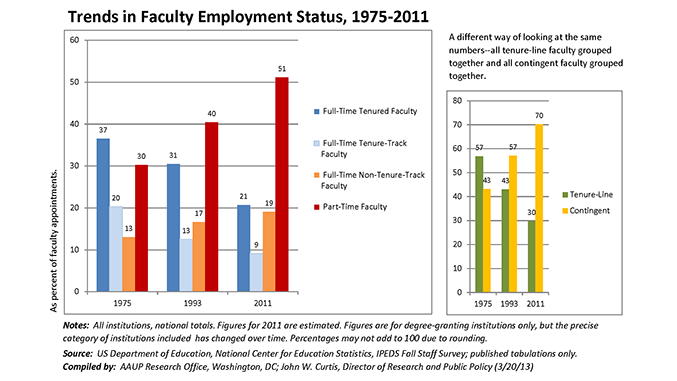Introducing the AAR Contingent Faculty Task Force
I’ve only had contingent positions. I started adjuncting as a graduate student for extra money. While writing my dissertation, I continued adjuncting at both a community college and a university. I was an adjunct (part-time) instructor at multiple institutions in three different states until I received a full-time non-tenure track job as a lecturer in 2011. I’ve taught at community colleges and big state universities, and for a long time, I taught heavy course loads while keeping up my research and applying for tenure track jobs. I quit my lecturer job because I could not handle the strain of contractual work. Now, I’m a freelance writer, work from home mom, and still a religious studies scholar.
I’ll say it again: I have only had contingent positions.
This shouldn’t necessarily be surprising since contingency is now the norm, rather than the exception, despite what the AAR/SBL jobs report tries to suggest. The AAUP notes that 76% of the instructional positions at American universities and colleges are non-tenure track. Since 1975 tenured and tenure-track positions are up by 26% while part-time appointments are up 300%. My story illuminates the reliance (or dare I say over reliance?) on contractual labor in higher-ed generally and within religious studies more particularly. Contingency, then, impacts our field in ways that we don’t quite understand yet.
This is why I was excited that the AAR decided to start a task force on contingency in religious studies. I’m chairing the task force, which includes Kerry Danner-McDonald, Amy Hale, Hussein Rashid, David Watt, Matthew Bingley, and Sylvester Johnson. Robert Puckett and Sarah Levine are our AAR staff liaisons. The task force includes scholars both off track and on, who teach/taught at universities, liberal arts colleges, and community colleges in classrooms and online. Kerry has a background in labor organizing for adjuncts. Hussein describes himself as an “independent contractor,” who teaches alongside other projects. Amy teaches at a variety of institutions online and off, and she also organized a workshop about alternative academic careers for the national meeting. Matthew teaches primarily online at a community college. David is the chair of the AAR’s Academic Relations Committee and brings the perspective of department chairs. Sylvester trains graduate students. This dynamic group has plenty of ideas of what the AAR can do for members who happen to be in contingent positions, and we are trying to figure out what changes our learned society can accomplish.
We met for the first time at the AAR Annual Meeting in San Diego. We put together a panel on contingency in religious studies, which covered organizing, rethinking our labor, the emotional and mental toll of adjuncting, and gendering temporary work in religious studies. We also hosted a reception for contingent members. While the reception was well-attended, the audience for the panel was small and consisted of mostly women in contingent positions. There was only one tenured faculty member in attendance—David—and he was the chair of our panel. While I’m glad that the AAR is putting forth efforts to help contingent workers, I worry about whether members of our learned society are concerned about these pressing labor issues.
The task force is trying to figure out what the AAR in particular can do for members, which means that first we are collecting data about our members and planning to conduct department surveys. We are also considering recommendations for travel grants for contingent members, restructuring the dues for membership, and online access to scholarly databases.
One of our goals is to get information about contingent faculty on the AAR’s website as well as a monthly column on contingency for Religious Studies News (RSN). Please consider sending your stories about adjuncting and lecturing in our field for the monthly column to RSN submissions (rsn@aarweb.org). You can contact me at kellyjbaker@gmail.com with pitches or ideas as well.
Additionally, please feel free to send me any concerns or questions for the task force to consider. I’m eager to hear what your experiences are, so we can get a more complete picture of how contractual labor impacts religious studies.
Kelly J. Baker received a PhD in religion in 2008. She's a writer based in Tallahassee, FL. She writes regularly about higher education, gender, religion, racism, and monsters. She's a columnist for Chronicle Vitae and the author of Gospel According to the Klan (University Press of Kansas, 2011) and The Zombies Are Coming! (Bondfire Press, 2013). You can find her online at www.kellyjbaker.com
Graph above: "Trends in Faculty Employment Status, 1975‐2011." Data compiled by John W. Curtis, Director of Research and Public Policy, AAUP Research Office, Washington, DC. Collected as part of the larger AAUP report, The Employment Status of Instructional Staff Members in Higher Education, Fall 2011.




